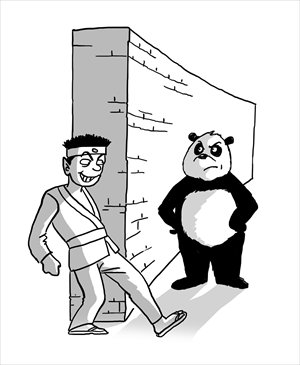War with Japan means disaster, win or lose

From 1860-1945, Japan was largely the bane of China's development. It interrupted two important development opportunities of China.
Today it's the third time that China has restarted modernization as it enters into a key period after 34 years of reform and opening-up. Will China be interrupted by Japan and forced to suspend modernization for a third time?
In 1861, China awakened after two opium wars, and began to learn from the West. For decades afterward, great changes took place in the composition of China's economy, as a modernized industrial base was taking shape and a new middle class was slowly growing.
China's political framework, especially improved laws and institutions, was also growing closer to global norms. A brand-new China was predicted, and equal treatment from all countries might not have been far off.
However, the literati-official class and military hawks became self-satisfied and conceited. In the 33rd year of the Westernization Movement (1861-94), China battled against Japan for Korea's future in the Sino-Japanese War (1894-95). Within a few months, the Chinese army's true strength was revealed.
The disastrous defeat meant an end to the policies of seeking rejuvenation through learning from the West, and the beginning of the imitation of Japan's reforms.
It was a great pity that China was forced to stop the Westernization Movement. Supposing that the Qing rulers listened to the anti-war opinions and China followed the road of "Westernized Chinese Style" rather than battling against Japan for Korea, what would China have been like?
At the beginning of the Westernization Movement, China only learned science and technology from the West. One decade later, China accepted public international law with the expansion of Sino-foreign trade and investment.
After another decade, China also discussed the feasibility and possibility of political reform. If it had developed in this way, China would not lag far behind the world.
But history cannot be rewritten. After the Sino-Japanese War, China's previous efforts were in vain. Following another three decades of unrest and then reunion in 1928, a new round of modernization started.
Honestly, the view that the decade from 1928 to 1937 was the golden age for China's capitalism is exaggerated, but China's modernization did make remarkable progress during that period.
The World War II changed both China and the world. Japan interrupted China's modernization process a second time. The war cost China numerous lives and resources. What's more, the modernization process that started before the war completely stopped.
Now, China has arrived at another historically crucial moment. More than three decades of reform and opening-up has encouraged Chinese to say "No," while the fact that Japan is pressing its claims and makes not the slightest concession constantly enrages Chinese.
Admittedly, gone are the days of impoverishment and debility. However, we should never forget that conflict with Japan twice shattered China's dream of modernization.
Today, history has given a thriving China more space for strategic choices. It's not only the diplomatic authorities' responsibility, but also an alarm sounded for all Chinese to control Sino-Japanese diplomatic risks and prevent Japan from interrupting China's modernization for a third time.
A series of internal problems have stemmed from China's economic growth over the past 34 years, which may cause Japan's mistaken judgments and provocations of China.
But I think that Japan defies China on the Diaoyu Islands more out of its belief that if given another 20 years of peace, China can orderly resolve some problems as it wishes. By then, Japan will be no match for China in GDP, and will lose its century-long sense of superiority toward China.
But for China, if a war over the Diaoyu Islands dispute erupts, even if China wins the war, its modernization process would be broken for a third time, with existing problems delayed infinitely rather than solved.
The author is a researcher at Institute of Modern History under the Chinese Academy of Social Sciences. opinion@globaltimes.com.cn